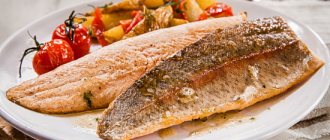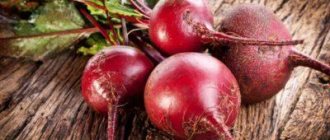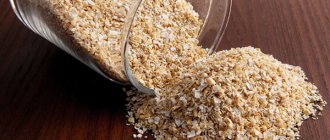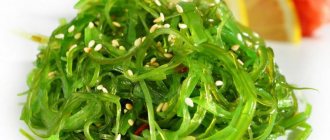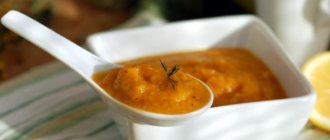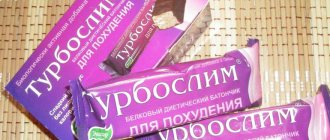It is a known fact that many seafood are very healthy.
They are low in calories, nutritious and provide the body with protein. For these and other reasons, they are often included in the menu for those who adhere to a diet or proper nutrition. There is debate about the benefits of octopus and whether it can be eaten every day. All the pros and cons of using this product will be described in this article, but whether to give preference to it or not is everyone’s business. What do you prefer?
Difference between octopus and squid
Although both sea creatures are cephalopods, the differences between them are significant. An elongated body shape, similar to a cigar head, separated from the body, a larger number of tentacles (10 versus - characteristics of a squid.
An elongated body shape, similar to a cigar head, separated from the body, a larger number of tentacles (10 versus - characteristics of a squid.
- The octopus has a bell-shaped body with four pairs of tentacles. He prefers to move along the seabed, crawling slowly, even lazily. The squid moves like a rocket through the water.
- While hunting, the octopus skillfully dresses itself, waiting for the right moment to attack. However, his opponent is quick and fast.
- Both cephalopods can change color, but for different reasons. The octopus has color as a mood indicator, and the squid has a camouflage that can be changed in an emergency. He has an advantage over his man: he can shine.
- Bioluminescence is the result of special organs of mollusks.
- The lifestyle of octopuses is ascetic, squids lead a sociable lifestyle.
Ingredients and calories
Octopus meat is consumed only after good heat treatment . This makes it soft and delicate, which is why it has many fans. This product is attractive for its richness of vitamins, minerals, and low calorie content. Omega-3 took first place among the substances necessary for humans with its 350 mg. Additionally:
- Cholesterol - 48 mg, vitamins A, E, K, PP and group B, necessary for human health. Choline is no less important among them. Nourishes the brain and nervous system. B12 is the most important vitamin that supports DNA and myelin synthesis.
- Iodine, antioxidants, or - selenium, zinc, cobalt - take up a lot of space in the meat of these seafood. Selenium prevents the development of cancer cells and strengthens the cardiovascular system. When combined with vitamin E, it creates antibodies that help strengthen the immune system.
- A person who regularly eats seafood and octopus meat is not at risk of anemia, dermatitis, nail pathology, or increased growth of existing tumors. All this fights zinc. Its role in the fight against infectious diseases and increasing the body's protective properties is enormous.
- Phosphoric acid is the main building block of an enzyme compound that allows chemical reactions to occur in the cells of the human body.
- Cobalt promotes the metabolism of fatty acids, carbohydrates and folic acid. This is necessary to normalize blood sugar levels, heart and blood vessels.
- Amino acids are glycine, lysine, valine, tyrosine, methionine.
- Glycine helps reduce stress and improve mental performance.
- Lysine will help people suffering from frequent herpetic rashes fight the disease, and will also help them absorb proteins.
- Tyrosine fights depressed brain function, depression and chronic fatigue, hypotension and vascular dystonia.
- Methionine protects the liver from pathogenic microorganisms.
The health benefits of octopus meat are becoming increasingly important due to its low calorie content - 82 kcal per 100 g of product. The content of proteins, fats and carbohydrates in it is slightly higher than 18 g, where proteins occupy a significant part - almost 15 g.
The high composition of nutrients in octopus meat and low calorific value mean that the product is sought after not only by gourmets, but also by people who care about their health.
Composition of the product
Octopus includes the following components:
- protein;
- vitamins A, D, E, C, PP and B;
- calcium;
- phosphorus;
- iron;
- sodium;
- potassium;
- iodine;
- zinc;
- selenium;
- Omega 3 fatty acids;
- copper;
- manganese.
Now we can move on to the list of beneficial properties, as well as the calorie content of octopus per 100 grams of the finished product.
Why is it useful?
Overall benefit
The usefulness of octopus is determined by its beneficial effects on human health:
- normalization of pressure;
- skin treatment;
- saturation with energy (important for heavy physical work);
- strengthening the pancreas and digestive system;
- tumor control, aging, anemia, asthma and bronchitis.
For women
The octopus will become one of the first assistants of the fair sex, who is most afraid of problems with prolonging youth and skin condition. The female figure will take the shape it needs when eating dishes from this shellfish. Meat is also beneficial for female reproductive functions .
For men
In addition to the health benefits of all octopus components, men who regularly use this product will experience an increase in muscle mass.
During pregnancy
For pregnant women, eating octopus meat in small portions is beneficial due to the huge amount of omega-3 fatty acids, vitamins and microelements contained in it.
During feeding
The period of breastfeeding should not be prohibited in food, unless it causes negative reactions in the child and mother. However, moderation in such foods and specialized advice will help avoid serious health complications .
For children
6-8 years is the age from which such an exotic product can be extremely useful in the absence of an allergic reaction. Strengthening bones, tooth enamel, improving brain function - all this occurs under the influence of beneficial substances contained in octopus meat. This product is especially useful when replacing natural baby teeth.
The period of active growth of a child is a time during which the use of an octopus is especially valued. The product helps stimulate brain activity, strengthen memory and develop children's intelligence.
In losing weight
Due to its high protein content, low fat and carbohydrate content, octopus meat is ideal for those who want to lose weight without making major sacrifices , such as giving up red meat.
The meat of exotic shellfish is full of useful ingredients that improve vision, remove water and fats from the body. Elderly people will find there a product that helps treat atherosclerosis and prevent Alzheimer's disease. In addition, they will appreciate its nutritional value, minimal calorie content and ease of digestion.
Hypoxia problems can also be solved with octopus meat because it is a type of antioxidant that enriches the body with oxygen. The consumption of these seafood is not limited by the age of the consumer.
Benefits of use
The beneficial properties of the plant have been known since prehistoric times.
Science paid attention to them in the 16th century, at which time it was recommended for use in the treatment of various diseases.
But scientific research for the most part stopped at the same properties that traditional medicine used in poppy. The grains were used to improve the sleep of patients, for pain relief, and for expectoration. In particular, poppy was also used as an anti-inflammatory agent.
- Since ancient times, decoctions have been used to treat fever, to treat swelling of various joints and to cleanse the skin of warts. The grains not only served as a seasoning for various dishes, but were also actively used in baking muffins and bread.
- Due to the presence in the plant of the alkaloid component morphine, previously widely used in medicine, ripe poppy seeds help cope with headaches, as well as accelerate the healing of various wounds, and restore the body after illnesses.
- Immunity can also be increased by consuming products made from it, since poppy seeds provide the body with large amounts of zinc, which is one of the substances that reproduce white blood cells. The substances contained in the product help the body's defense response to fight viruses and bacteria that enter the body.
- The potassium contained in the seeds relaxes the walls of blood vessels, and this helps reduce pressure in the arteries and also prevents the formation of blood clots in the vessels. To some extent, it also helps fight the occurrence of atherosclerosis.
- The iron found in the seeds increases hemoglobin in the blood and the number of red blood cells, which ensure the flow of oxygen to the body's tissues. So poppy gives a person an additional boost of energy.
- With age, the retina of the eye may lose its properties. The substances contained in poppy (antioxidants, vitamins, etc.) can help prevent such age-related changes. Poppy will help maintain good color vision into old age.
- Ripe seeds can serve as a good remedy for preventing the occurrence of type 2 diabetes, since its occurrence, in particular, is associated with a lack of zinc compounds in the body, of which there is more than enough in edible poppy.
- Although it is impossible to consume a large number of seeds at the same time, the small amount that we consume with buns and other products to some extent reduces the risk of developing osteoporosis, restores calcium deficiency in the bones, and generally fights demineralization. The same goes for teeth. The plant contains a lot of calcium. But of course, just consuming its seeds will not completely solve this problem.
- Seed products relieve poisoning with diarrhea, as well as inflammatory processes in the gastrointestinal tract. The plant fibers contained in the product restore intestinal motility, which helps combat constipation, and also normalizes stomach function.
- Poppy is a good sleeping pill and sedative. Its use prevents nervous and even mental illnesses; they can be used as antidepressants (and work immediately, and do not accumulate a cumulative effect) - poppy seeds stabilize nervous processes and even out mood.
- Eating poppy seeds makes a person more resilient in various stressful situations.
Harm and contraindications
Octopus meat is not ideal for general consumption. When a rash and pimples on the skin, nausea, vomiting and other signs of poisoning appear after eating, they aggravate existing diseases - most likely this is an individual intolerance to the product.
Like all existing seafood, octopus should not be eaten once thawed : it quickly breaks down its protein, leading to food poisoning. The octopus in his body is capable of collecting mercury and its compounds. Insufficient heat treatment leads to deterioration of vision, hearing and nervous system.
Diseases of the gallbladder, ulcers of the stomach, intestines, and pancreas will increase as a result of eating mussel meat. Carelessness in the use of the product by pregnant and nursing mothers can cause problems with the health and condition of their child.
To prevent octopus from becoming a source of health problems, you need to pay attention to the selection and preparation of dishes from it.
Nutritional value
There are two types of octopus that are suitable for food: the common octopus (Octopus vulgaris), which lives in the Atlantic Ocean, and the giant octopus (Enteroctopus dofleini), which is caught in the North Pacific Ocean. The latter can reach a weight of 45 kg. Both varieties mentioned can be safely classified as low-calorie seafood, containing less than 100 calories per serving (approximately 85 g).
Common Atlantic
Per serving: 70 calories, 13 g protein and 2 g carbohydrates, 0.9 g fat and 41 mg cholesterol. Water content is 80%, or 68 g. Does not contain sugar or fiber.
Composition of Atlantic octopus meat (as a percentage of the recommended daily dose):
- 54%, or 38 mg of selenium,
- 25%, or 4.5 mg iron,
- 19%, or 0.4 mg copper,
- 16%, or 158 mg phosphorus,
- 9%, or 298 mg potassium,
- 9%, or 1.4 mg zinc,
- 9%, or 1.8 mg niacin.
Plus 196 mg sodium, 45 mg calcium, 26 mg magnesium and trace amounts of manganese. As for other vitamins, their contribution is at least 5% of the recommended amount.
Giant Pacific
Per serving: 48 calories, 10.5 g protein, 0.7 g fat and 2 mg cholesterol. Water content: 84%, or 72 g. No carbohydrates.
Composition of giant Pacific octopus meat:
- 23%, or 4.1 mg iron,
- 16%, or 0.32 mg copper,
- 13%, or 134 mg phosphorus,
- 8%, or 1.2 mg zinc,
- 9%, or 1.7 mg niacin.
Pacific octopus also contains 30 mg of calcium and trace amounts of manganese.
As you can see, this seafood contains a lot of iron: it is involved in the formation of red blood cells, the development of brain structures, and normalizes body temperature. A deficiency of this microelement leads to weakness, fatigue and anemia.
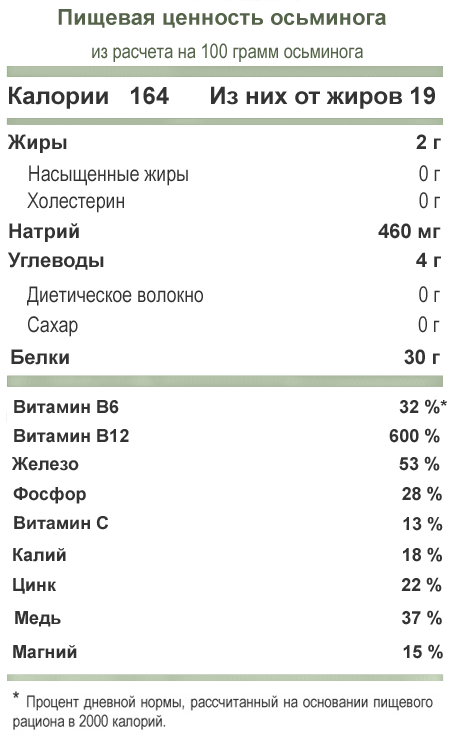
How to select and keep an octopus
The first sign of a product's freshness is its smell. Fresh octopus should smell like sea fish. The choice is more focused on its size: the meat of a large octopus is usually hard and tasteless, while the meat of small and medium ones, weighing less than 1 kg, is soft and juicy. When purchasing octopus, you should focus on freshness. The eyes of cephalopods speak about this: if it’s transparent, it’s worth buying, if it’s cloudy, don’t risk it. It's true, you can't always find the eyes because the big octopus is sold in parts. The body must be strong. This is easy to check: it disappears when you press the hole. It is said that the skin that cleanses the octopus' meat is not "its first freshness." A light brown tint is a sign of successful absorption. The inside of the tentacle should be lighter than the outside. Cephalopod poppies must be clean and free of stains. It is better to buy the whole carcass, not just the tentacles. This is a guarantee of product freshness. The package of canned octopus should have a good overview of the date, expiration date and a list of only the necessary ingredients.
Fresh octopus, even frozen, should be stored in vacuum sealed containers for no more than three days. Continued storage may lead to health problems. Raw shellfish should be boiled, cooled and only then vacuum packed. How to clean an octopus Running water will help to quickly clean the octopus of sand and dirt. The octopus carcass begins to peel off its head. A knife tentacle separates them from him. Then they start removing the eyes. The inside of the head well has been cleaned. The existing vestigial resemblance to a beak is squeezed out and thrown away. All are completely broken. The octopus skin is usually removed after cooking. Just 5-10 minutes of boiling to easily remove the skin from the cooled carcass.
A carcass left in the freezer for 1-3 days becomes softer due to the water remaining in the meat: it turns into ice and breaks down nerves and muscle fibers. A properly cleaned octopus carcass is a guarantee of food safety.
How to cook octopus: recipes
Already in ancient times, people knew about the taste of this mollusk. It is known, for example, that in Ancient Greece stuffed octopus head and tentacles were considered a good dish. The food was baked and tasted like cake.
Not only chefs, but also ordinary housewives know countless ways to prepare octopus. This seafood makes a great combination with onions, garlic, tomatoes, lemon, olive oil, rice, wine and soy sauce . Gourmets and lovers of the product will not be surprised not only by appetizers and salads with octopus, but also by main dishes made from this seafood. Cooking, baking, stewing, marinating, minced meat, baking - all these actions with octopus meat are available to every cook. It is also used to produce minced meat and cutlets. Different nations have their own preferences. So, the Japanese love octopus with rice. For the Chinese, sauces come first. Koreans may serve live octopus as a dish. Polynesians love dried octopus, cooked in coconut milk or baked in a clay oven. In Europe, they are more accustomed to this product in the form of cake and soup.
Small octopuses are good if they are grilled. If not, then this can be done using large carcasses, pre-cut into pieces.
Note : Bivalve meat that has been cut or lightly frozen before cooking becomes especially tender.
Octopus in soy sauce
A dish with octopus in “union” with soy sauce, olive oil or wine vinegar will acquire a special and unique taste. Let's think about a simple recipe. Method of preparation: cut into slices (500 g of meat) for baking in flour. Place the slices in a hot frying pan with a minimum amount of oil. Fry for no more than 3 minutes. Take 2-3 cloves of garlic, finely chop. Then add 4 tablespoons of cream, 80 g of butter, 0.5 cups of water, salt and curry pepper to the meat (to taste). Cook covered for 5 minutes over low heat.
Serve rice as a side dish, season with soy sauce.
Grilled octopus
Place the oiled octopus on the hot grill for about 10 minutes. A signal of readiness is the appearance of blush on the meat. After frying on both sides, serve the dish with grated garlic sauce with olive oil and a squeeze of lemon juice.
Fried octopus
Pre-cooked octopus, preferably small in size, cut into cubes and fry in boiling oil over high heat. Drain any water that has been drained. The next step is to add a mixture of olive oil and a few cloves of garlic to the meat. To try it, add some lemon juice. After about a quarter of an hour, he added that they believe that not all species are known to science.
Tips for use
When using drugs made from poppy seeds, strict medical supervision is required. This does not apply to the use of products made from ripe poppy seeds in traditional medicine and nutrition. But excessive enthusiasm for such a product, which contains a lot of calories, will be wrong. You can eat up to 100 or a little more grams of seeds per day.
The main consumption of the grains usually occurs in baked goods sprinkled with the seeds, but you can also make pancakes and rolls by mixing the poppy seeds directly into the dough. There is also milk of the poppy - this product is prepared from grains ground into flour and mixed with honey. Nowadays, they also add crushed seeds to kefirs or yoghurts, fry the seeds in oil and season side dishes with them.
Interesting Facts
Blood flows through the mussel's body because it has three hearts. Two hearts send blood to the gills, one circulates throughout the body. There is a lot of copper in the blood of this creature, which is why it is “aristocratic,” that is, blue.
In addition to changing color depending on their mood and location as a means of defense, octopuses are able to repel predators by imitating their behavior. When its tentacles leave, after a while they grow back to the place where they were lost. In a few minutes of danger, an octopus, like a lizard throwing its own tail, can break its tentacles itself.
This mollusk has no hearing, and neither species has a healthy connection. The lifespan of different species of octopuses ranges from six months to five years . Men are often the leading cause of death. Women can also eat them. Females die when their babies are born. He must fight for his survival. But among the octopuses that are “indifferent” to the future of their “children,” there are exceptions. So the Pacific striped mollusk does not leave the female for a long time; for several months it is “miserable” to live with her. And the mother has more than a month to worry.
general characteristics
Octopuses are quite ancient creatures. They have an unusual structure. Their body is soft, short, oval-shaped. The skeleton is missing. They have about 8 legs - tentacles (hence the name), on which suction cups are located. The retina of the eyes is directed outward. At the junction of the tentacles there is a mouth opening with two jaws.

It is worth noting that the mollusk’s brain is quite developed . These creatures are able to distinguish sounds, geometric shapes, and they have a good memory. They have three hearts. Another feature they have is blue blood.
On average, mollusks live for about three years . They live in seas and oceans with a certain salt composition.
Octopus is a popular food in many countries. The cooked shellfish meat is creamy in color, tastes very juicy and tender, but at the same time low in calories.
